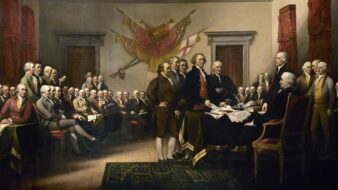


Introduction
The Second Continental Congress not only issued a directive to the colonial legislatures to create new state constitutions; they also initiated the adoption of the first governmental system for the United States. On May 15, 1776, the Second Continental Congress, meeting in Independence Hall, Philadelphia, issued a “Resolve” to the thirteen colonies. And the Second Continental Congress created the first continental system of governance: the Articles of Confederation. The Articles created an “assemblage” of pre-existing states, as opposed to a government over, of, and by individuals. The states received equal representation in the confederation regardless of the size of population. The Articles created a single Congress exercising legislative, executive, and judicial powers, and the powers of this Continental Congress were limited to those expressly enumerated in the Articles. To act, Congress required a super majority of the thirteen states. Only amendments could endow the confederation with powers not expressly granted, and amendments required the approval of all thirteen state legislatures. Because of territorial disputes between two states, the Articles did not come into operation until March 1781.
Representatives Samuel Adams of Massachusetts, John Dickinson of Delaware, Richard Henry Lee of Virginia, and Roger Sherman of Connecticut helped draft the Articles of Confederation. Signers of the Articles included Daniel Carroll of Maryland, John Dickinson, Gouverneur Morris and Robert Morris, both of Pennsylvania, and Roger Sherman, all of whom would later sign the Constitution.
Source: Charles Tansill, ed., Documents Illustrative of the Formation of the Union of the United States (Washington, DC: Government Printing Office, 1927), 27-37. The Roman numerals identifying each of the thirteen articles are in the original.
Articles of Confederation and perpetual Union between the states of New Hampshire, Massachusetts-bay, Rhode Island and Providence Plantations, Connecticut, New York, New Jersey, Pennsylvania, Delaware, Maryland, Virginia, North Carolina, South Carolina and Georgia.
Article I.The Stile of this Confederacy shall be “The United States of America”.
Article II. Each state retains its sovereignty, freedom, and independence, and every power, jurisdiction, and right, which is not by this Confederation expressly delegated to the United States, in Congress assembled.
Article III. The said States hereby severally enter into a firm league of friendship with each other, for their common defense, the security of their liberties, and their mutual and general welfare, binding themselves to assist each other, against all force offered to, or attacks made upon them, or any of them, on account of religion, sovereignty, trade, or any other pretense whatever. . . .
Article V. For the most convenient management of the general interests of the United States, delegates shall be annually appointed in such manner as the legislatures of each State shall direct, to meet in Congress on the first Monday in November, in every year, with a power reserved to each State to recall its delegates, or any of them, at any time within the year, and to send others in their stead for the remainder of the year.
No State shall be represented in Congress by less than two, nor more than seven members; and no person shall be capable of being a delegate for more than three years in any term of six years; nor shall any person, being a delegate, be capable of holding any office under the United States, for which he, or another for his benefit, receives any salary, fees or emolument of any kind.
Each State shall maintain its own delegates in a meeting of the States, and while they act as members of the committee of the States.
In determining questions in the United States in Congress assembled, each State shall have one vote. . . .
Article VI. No State, without the consent of the United States in Congress assembled, shall send any embassy to, or receive any embassy from, or enter into any conference, agreement, alliance or treaty with any King, Prince or State; nor shall any person holding any office of profit or trust under the United States, or any of them, accept any present, emolument, office or title of any kind whatever from any King, Prince or foreign State; nor shall the United States in Congress assembled, or any of them, grant any title of nobility.
No two or more States shall enter into any treaty, confederation or alliance whatever between them, without the consent of the United States in Congress assembled, specifying accurately the purposes for which the same is to be entered into, and how long it shall continue. . . .
No vessel of war shall be kept up in time of peace by any State, except such number only, as shall be deemed necessary by the United States in Congress assembled, for the defense of such State, or its trade; nor shall any body of forces be kept up by any State in time of peace, except such number only, as in the judgment of the United States in Congress assembled, shall be deemed requisite to garrison the forts necessary for the defense of such State; but every State shall always keep up a well-regulated and disciplined militia, sufficiently armed and accoutered,[1] and shall provide and constantly have ready for use, in public stores, a due number of field pieces and tents, and a proper quantity of arms, ammunition and camp equipage.
No State shall engage in any war without the consent of the United States in Congress assembled, unless such State be actually invaded by enemies . . . .
Article VIII. All charges of war, and all other expenses that shall be incurred for the common defense or general welfare, and allowed by the United States in Congress assembled, shall be defrayed out of a common treasury, which shall be supplied by the several States in proportion to the value of all land within each State, granted or surveyed for any person, as such land and the buildings and improvements thereon shall be estimated according to such mode as the United States in Congress assembled, shall from time to time direct and appoint.
The taxes for paying that proportion shall be laid and levied by the authority and direction of the legislatures of the several States within the time agreed upon by the United States in Congress assembled.
Article IX. The United States, in Congress assembled, shall have the sole and exclusive right and power of determining on peace and war, except in the cases mentioned in the sixth article—of sending and receiving ambassadors—entering into treaties and alliances . . . .
The United States, in Congress assembled, shall have authority to . . . . ascertain the necessary sums of money to be raised for the service of the United States, and to appropriate and apply the same for defraying the public expenses—to borrow money, or emit bills on the credit of the United States, transmitting every half-year to the respective States an account of the sums of money so borrowed or emitted—to build and equip a navy—to agree upon the number of land forces, and to make requisitions from each State for its quota, in proportion to the number of white inhabitants in such State; which requisition shall be binding, and thereupon the legislature of each State shall appoint the regimental officers, raise the men and cloath, arm and equip them in a solid-like manner, at the expense of the United States . . . .
The United States, in Congress assembled, shall never engage in a war, nor grant letters of marque[2] or reprisal in time of peace, nor enter into any treaties or alliances, nor coin money, nor regulate the value thereof, nor ascertain the sums and expenses necessary for the defense and welfare of the United States, or any of them, nor emit bills, nor borrow money on the credit of the United States, nor appropriate money, nor agree upon the number of vessels of war, to be built or purchased, or the number of land or sea forces to be raised, nor appoint a commander in chief of the army or navy, unless nine States assent to the same: nor shall a question on any other point, except for adjourning from day to day be determined, unless by the votes of the majority of the United States in Congress assembled. . . .
Article XIII. Every State shall abide by the determination of the United States in Congress assembled, on all questions which by this confederation are submitted to them. And the Articles of this Confederation shall be inviolably observed by every State, and the Union shall be perpetual; nor shall any alteration at any time hereafter be made in any of them; unless such alteration be agreed to in a Congress of the United States, and be afterwards confirmed by the legislatures of every State. . . .
Articles of Confederation
March 01, 1781
Conversation-based seminars for collegial PD, one-day and multi-day seminars, graduate credit seminars (MA degree), online and in-person.































































































































































